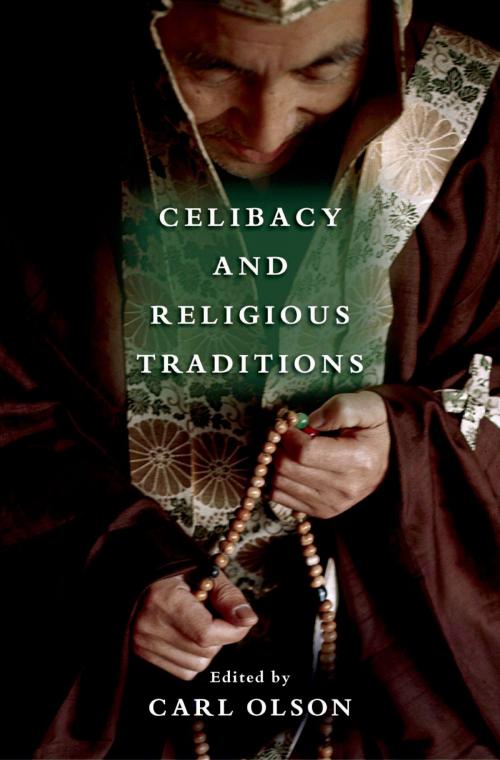Celibacy and Religious Traditions
Nonfiction, Social & Cultural Studies, Social Science, Sociology, Marriage & Family, Religion & Spirituality, Reference, Comparative Religion, History| Author: | ISBN: | 9780190294373 | |
| Publisher: | Oxford University Press | Publication: | December 7, 2007 |
| Imprint: | Oxford University Press | Language: | English |
| Author: | |
| ISBN: | 9780190294373 |
| Publisher: | Oxford University Press |
| Publication: | December 7, 2007 |
| Imprint: | Oxford University Press |
| Language: | English |
If sexuality is inherently social, the same thing can be said about celibacy. An understanding of celibacy, argues Carl Olson, can be a useful way to view the significance of the human body within a social context. The purpose of this book is to examine how the practice of celibacy differs cross-culturally as well as historically within a particular religious tradition. The essays (all previously unpublished) will demonstrate that celibacy is a complex religious phenomenon. The control of sexual desire can be used to divorce oneself from a basic human biological drive, to separate oneself from what is perceived as impure, or to distance oneself from a transient world. Within different religious traditions there can be found the practice of temporary celibacy, commitment to long-term permanent celibacy, and outright condemnations of it. By maintaining a state of virginity, members of some religious traditions imitate divine models; other traditions do not admit the possibility of emulating such paradigms. Whether or not a religious tradition encourages or discourages it, the practice of celibacy gives us insight into its worldview, social values, gender relations, ethics, religious roles, and understanding of the physical body. Celibacy can contribute to the creation of a certain status and play a role in the construction of identity, while serving as a source of charisma. In some religious traditions, it is possible to renounce sex and gain sacred status and economic support from society. Each essay in the collection will be written by an expert in a particular religious tradition. Each will address such questions as: Why do some members of a religious community decide to maintain a celibate style of religious life? Is celibacy a prerequisite for religious office or status? Are there different contexts within a given religious tradition for the practice of celibacy? What does the choice of celibacy tell us about the human body in a particular religious culture? What is the symbolic significance of celibacy? What is its connection to the acquisition of power? What are its physical or spiritual benefits? The first collection of its kind, this book will be a valuable resource for courses in world religions, as well as a contribution to our understanding of this very widespread but puzzling human phenomenon.
If sexuality is inherently social, the same thing can be said about celibacy. An understanding of celibacy, argues Carl Olson, can be a useful way to view the significance of the human body within a social context. The purpose of this book is to examine how the practice of celibacy differs cross-culturally as well as historically within a particular religious tradition. The essays (all previously unpublished) will demonstrate that celibacy is a complex religious phenomenon. The control of sexual desire can be used to divorce oneself from a basic human biological drive, to separate oneself from what is perceived as impure, or to distance oneself from a transient world. Within different religious traditions there can be found the practice of temporary celibacy, commitment to long-term permanent celibacy, and outright condemnations of it. By maintaining a state of virginity, members of some religious traditions imitate divine models; other traditions do not admit the possibility of emulating such paradigms. Whether or not a religious tradition encourages or discourages it, the practice of celibacy gives us insight into its worldview, social values, gender relations, ethics, religious roles, and understanding of the physical body. Celibacy can contribute to the creation of a certain status and play a role in the construction of identity, while serving as a source of charisma. In some religious traditions, it is possible to renounce sex and gain sacred status and economic support from society. Each essay in the collection will be written by an expert in a particular religious tradition. Each will address such questions as: Why do some members of a religious community decide to maintain a celibate style of religious life? Is celibacy a prerequisite for religious office or status? Are there different contexts within a given religious tradition for the practice of celibacy? What does the choice of celibacy tell us about the human body in a particular religious culture? What is the symbolic significance of celibacy? What is its connection to the acquisition of power? What are its physical or spiritual benefits? The first collection of its kind, this book will be a valuable resource for courses in world religions, as well as a contribution to our understanding of this very widespread but puzzling human phenomenon.















